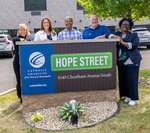
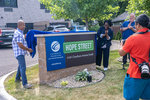
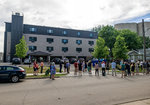











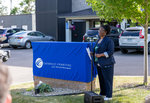
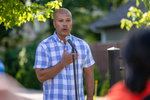
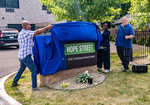
On June 21, Catholic Charities of St. Paul and Minneapolis marked the opening of a new location for Hope Street for Youth, the largest emergency shelter for youth in the state of Minnesota. Hope Street is moving from its current location in South Minneapolis to a former assisted living facility in Minneapolis’s Hiawatha neighborhood. Over more than 20 years, Hope Street has served thousands of youth, and it currently offers both emergency shelter and support for youth living independently across Hennepin County.
“For more than two decades, our team at Hope Street has helped thousands of youth find safety and support during life’s darkest and most challenging moments,” said Michael Goar, President and CEO of Catholic Charities of St. Paul and Minneapolis. “This new facility will enable us to strengthen our impact, helping more youth on their path to a stable and rewarding future.”
The Hope Street program encompasses both emergency shelter and permanent supportive housing in the community. The new location will include:
Critical Investments from Community Partners
Key partners made critical investments to make the new home for Hope Street for Youth a reality. Investments included $2.5 million in American Rescue Plan Act (ARPA) funds from the City of Minneapolis, $2.5 million from Hennepin County, and $1 million from a generous donor. These significant investments allowed Catholic Charities to purchase the new facility in March 2022.
“We are proud to support the new Hope Street for Youth facility, which is a critical investment in our efforts to support people facing housing instability,” said Commissioner Angela Conley, Hennepin County Board of Commissioners. “Housing is a fundamental human right, and youth should never have to worry about having a safe place to lay their heads. This new space will offer dignity and healing as youth build for their futures.”
“Hope Street is a model program that offers not only shelter but also an integrated safety net of support for young people experiencing homelessness,” said Jodi Harpstead, Commissioner of the Minnesota Department of Human Services. “Committed staff walk alongside youth, supporting them as they learn life skills to thrive. This approach has the ability to change the trajectory of lives.”
New Facility Opens Amid Growing Need
Each night, nearly 5,000 young people across Minnesota are without a home. Unfortunately, Hope Street staff were forced to turn away almost 1,000 youth last year because we lacked resources to support them. Young people experiencing homelessness face significant disparities in securing basic needs. They are statistically more likely to experience poverty, abuse, racism and homophobia — destabilizing traumas that can last into adulthood. Last year, more than 80 percent of the youth who received services from Hope Street were Black, Indigenous, and People of Color (BIPOC). Also, 23 percent of Minnesota youth experiencing homelessness identify as LGBTQ+, while only 4 percent of all Minnesotans identify as LGBTQ+. The youth who come to Hope Street are experiencing some of the most challenging moments in their lives, fleeing unsafe situations, violence, substance abuse, neglect, and rejection often without any plan — while other youth served have aged out of the foster care system or do not have families who can financially support them past the age of 18. Hope Street will continue to fill a critical gap in services to support this vulnerable population in a facility that offers dignity, safety, and respite.
The Hope Street for Youth Program Model: Supporting a Vulnerable Population
With an average stay of just 39 days, Hope Street staff have a very brief window of opportunity with youth in their care, providing as much support as possible to prevent homelessness from becoming their future. Hope Street’s trauma-informed care model reflects the need to create a safe space for youth to receive support as they work towards the goal of stable housing. Case managers assist youth with medical care, mental and chemical health counseling, family reunification, parenting support and education, one-to-one educational assistance, life-skills training, and more. Additionally, most youth at Hope Street are motivated to find employment and increase access to income through work. Youth drive determination of their readiness to exit the program, and case managers help ensure that each person is equipped with the resources for a successful transition. At Hope Street, youth can access vital services that interrupt this cycle, de-escalate crises, and help build a stable foundation.
“Everyone deserves a place to call home, and Hope Street for Youth is an important part of that solution in Minneapolis,” said Minneapolis Mayor Jacob Frey. “I am grateful to Catholic Charities for the strong partnerships they facilitated to make Hope Street a reality. Together, we can all work alongside our youth to build and sustain futures of possibility and success.”
Hope Street for Youth: Program History
For more than 20 years, the Hope Street program has been located on the Catholic Charities St. Joseph’s Home for Children campus, providing 24-hour access to emergency shelter beds, basic assistance, meals, and comprehensive case management for up to 28 youth (18 to 24 years of age). While the program had built strong ties to the neighborhood, the building itself no longer met the needs of youth experiencing homelessness.
In December 2021, Catholic Charities learned of an opportunity to move the program to a former assisted living facility — a turnkey building perfectly suited for this purpose — at 4140 Cheatham Avenue in Minneapolis’s Hiawatha neighborhood. The building was renovated significantly in 2018. Critical funding secured from the City of Minneapolis, Hennepin County, and key donors enabled Catholic Charities to purchase the facility in March 2022.
The building and location are ideal for Hope Street’s programs, providing dignified shelter and support to highly vulnerable young people as they work toward stability:
Hope Street staff and youth will move into their new home in late June.
Catholic Charities: Serving those Experiencing Homelessness and Housing Instability
Catholic Charities has a proven track record of creating significant public-private partnerships, leveraging resources, providing quality services, and managing projects with operational excellence for the benefit of vulnerable people and the broader community. Today, Catholic Charities operates four emergency shelters (serving single adults, youth, and families) and owns and manages more than 1,000 deeply affordable permanent housing units. In addition, Catholic Charities staff support people living in 550 additional apartments throughout the Twin Cities. The organization also operates two Opportunity Centers — one in Minneapolis and one in St. Paul — that serve as integrated, one-stop locations connecting people to critical services to improve their health, income, housing stability, and well-being. As homelessness increased in the past decade, our programs grew to meet those needs. We continue to invest in more infrastructure to support this critical work: (1) In 2012, we opened Higher Ground Minneapolis, which combines emergency and transitional shelter and permanent housing. (2) In 2019, we completed Dorothy Day Place, a two-building campus designed to prevent homelessness by focusing on three components: dignified shelter, more permanent homes and dedicated services that will create pathways out of poverty and homelessness; the campus — located in downtown St. Paul — serves 1,000 people per day. (3) In May 2022, we opened Endeavors Residence, a housing and health care campus which provides 173 deeply-affordable apartments and 30 medical respite beds for veterans, single adults and people with complex medical conditions.
ABOUT CATHOLIC CHARITIES OF ST. PAUL AND MINNEAPOLIS: Catholic Charities of St. Paul and Minneapolis serves and advocates on behalf of those most in need. Our programs for children, families and adults annually assist more than 20,000 people, regardless of faith, background or circumstance. Our dedicated staff partner with the individuals we support to create opportunities for them to thrive. Through social justice advocacy, Catholic Charities serves as a tireless voice for those who often go unheard. Thousands of dedicated volunteers, advocates and donors make our work possible. We are proud to have served as a critical part of our community’s social and civic infrastructure for more than 150 years. To learn more about our impact, please visit www.cctwincities.org.
Comments
No comments on this item Please log in to comment by clicking here